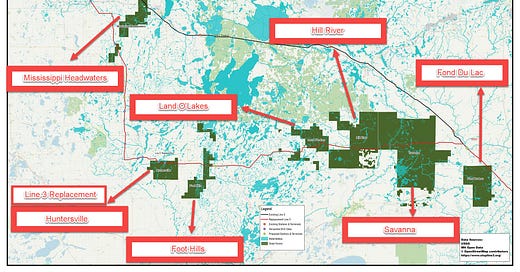Earth Watch June 11: News from the epicenter of the environmental movement
This week has been big for grassroots, Indigenous-led resistance to destructive oil, gas and logging projects. Here is your complete rundown of this week’s headlines.
TC Energy terminates Keystone XL Pipeline after Biden cancels permit
TC Energy, the company behind the Keystone XL pipeline, has officially given up on building the controversial pipeline project that would have carried Canadian Tar Sands oil from the oil fields of Alberta, Canada to Steele City, Nebraska. After years of pressure from Indigenous tribes and environmental organizations, President Biden finally canceled the pipeline’s permit. President Obama had revoked the permits during his Presidency, but the Trump administration reversed that decision. With TC Energy announcing that they will not pursue the project, it is probably safe to say that the Keystone XL Pipeline is dead. While this is a step in the right direction, President Biden has not yet responded to calls for him to cancel the Dakota Access Pipeline or the Enbridge Line 3 Pipeline, which leads us to the next story.
Indigenous leaders take a stand against Enbridge Line 3 Pipeline
In Northern Minnesota, around 2000-3000 people turned out this week and nearly 200 were arrested this week protesting the massively destructive Enbridge Line 3 Pipeline which is slated to cut through Anishinaabe territory and pump Canadian Tar Sands oil across the Mississippi River Watershed.
On Tuesday, Democracy Now! reported that protesters had chained themselves to construction equipment and that the Biden administration had sent a Customs and Border Patrol helicopter to disperse the protest by flying low to the ground and creating a dust storm. Police also reportedly used a Long Range Acoustic Device, or LRAD, in an attempt to force the protestors away by inflicting significant pain on their ears.
Branch Out published an in-depth look at the fight against Line 3 back in April when Indigenous youth staged a protest in Washington DC. Here is an excerpt from that article:
“The tar sands contain an estimated 170 billion barrels of crude oil, according to an EJOLT report. Bitumen is about 31% dirtier in terms of greenhouse gas emissions than other forms of fossil fuel, so Hansen estimates that turning to tar sands reserves will ultimately raise global CO2 concentration above 500 parts per million, or ppm. Currently, the atmosphere is at about 421 ppm, but scientists believe we need to stay at or below 350 ppm to avoid the most adverse effects of climate change: uninhabitable heat, sea-level rise, more frequent extreme weather events, and full-on climate collapse.”
Resistance grows against logging in Vancouver Island’s old-growth forest
Since August 2020, activists have been stopping the construction of new logging roads on Pacheedaht territory on Vancouver Island, British Columbia, at what has become known as the Fairy Creek Blockade. The blockade protects the old-growth forest from logging, as well as the Fairy Creek and Caycuse watersheds, which people fear could be polluted simply by the construction of the logging road.
A court injunction ordered the blockade to be cleared, but so far the number of people coming to Vancouver Island to join the blockade has only increased, with many people chaining themselves so that they obstruct the logger’s path and others living up in the trees for weeks on end. In total, more than 170 people have been arrested since May.
The blockade is being organized by the Rainforest Flying Squad who posted this on the Fairy Creek Blockade Facebook page:
“The Rainforest Flying Squad is a volunteer-driven, grassroots, non-violent direct-action movement, committed to protecting the last stands of globally significant ancient temperate rainforest on Vancouver Island. The Rainforest Flying Squad/LastStandforForests stands in solidarity with Elder Bill Jones and other members of the Pacheedaht First Nation who want the forests protected.”
More information at laststandforforests.com.




